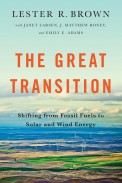Monday, November 23, 2009
The UN CC Conference (COP15) has the world buzzing. Delegations from 193 countries, at least 65 heads of state and government, along with thousands of others including the media, environmental organizations, and students will be attending.
We will be represented by Janet Larsen, our Director of Research, who will be in Copenhagen to speak at a pre-COP15 activity at an energy, climate, and food security symposium being held at the University of Copenhagen.
Discussing the problem of climate change and providing solutions has been a major focus of Earth Policy Institute from its initial book by Lester Brown, Eco-Economy: Building an Economy for the Earth to his most recent book, Plan B 4.0: Mobilizing to Save Civilization. We look at the world’s major global problems—and provide global solutions.
We have also been weighing in directly on the climate change conference in Copenhagen, most specifically on how climate change will detrimentally affect food production—and thus food security. Lester Brown has written several articles about the relationship between climate change and food security. The most recent, "A Hotter Planet Means Less on Our Plates," appeared on Sunday, November 22, in the Washington Post's'special climate change issue.
In the piece Lester points out that as the UN climate change conference approaches, "we are in a race between political tipping points and natural ones." And he raises questions: "Can we cut carbon emissions fast enough to keep the melting of the Greenland ice sheet from becoming irreversible? Can we close coal-fired power plants in time to save at least the larger glaciers in the Himalayas and on the Tibetan plateau? Can we head off ever more intense crop-withering heat waves before they create chaos in world grain markets?"
In the same section of the Washington Post, our data was used for several graphics on global renewable energy.
Earlier this month, Lester released a Plan B Update and spoke at a press teleconference on how the Copenhagen conference is really about food security, even though that is not the main agenda.
On November 10, The Ecologist ran an interview of Lester entitled "We Shouldn't Count on Copenhagen to Save Us." In reply to a question on what he expected to come out of the Copenhagen negotiations, Lester replied that while he didn't think there would be "anything bold coming out of Copenhagen. I think we should go to Copenhagen with a bold proposal and push really hard."
In his commentary "Time for Action is Upon Us" that ran in a special climate edition of Roll Call on November 9, Lester said, "As Congress continues debating climate change legislation, our leaders are faced with a choice: build on the progress we have made to curb emissions (U.S. carbon emissions dropped 9 percent between 2007 and 2009), grow clean energy companies and stop climate change, or stick our heads in the sand and delusionally hope the problem solves itself." He noted that the transition from fossil fuels to renewable energy sources is already underway in the United States, but the pace is far too slow either to stave off the worst effects of climate change or to ensure that American companies and workers secure the economic benefits of the emerging global clean energy economy.
He noted that we need a far more ambitious goal for cutting carbon emissions. A cut of 80 percent from today's levels by 2020, not 2050, would halt the rise in the atmospheric carbon dioxide concentration at 400 parts per million. We could then work to reduce carbon dioxide levels to 350 parts per million, which James Hansen, a leading U.S. government climate scientist, and Rajendra Pachauri, the head of the Nobel Prize-winning Intergovernmental Panel on Climate Change, are pushing for.
Bill McKibben and his organization 350.org is pursuing this goal as well. They even organized a "planetary day of action" on October 24, 2009 to draw attention to this important goal.
Another commentary by Lester on the U.N. Climate Change Conference was printed in The Guardian on November 3, 2009, entitled "We Only Have Months, Not Years, to Save Civilisation from Climate Change."
Lester's book, Plan B 4.0 provides solutions. Check it out. We have it online for free downloading.
We no longer have the luxury of time. We all need to weigh in on climate change and let our elected representatives know that the United States must take a bold approach.
Cheers,
Reah Janise Kauffman
Vice President
Page 1 of 1 pages


